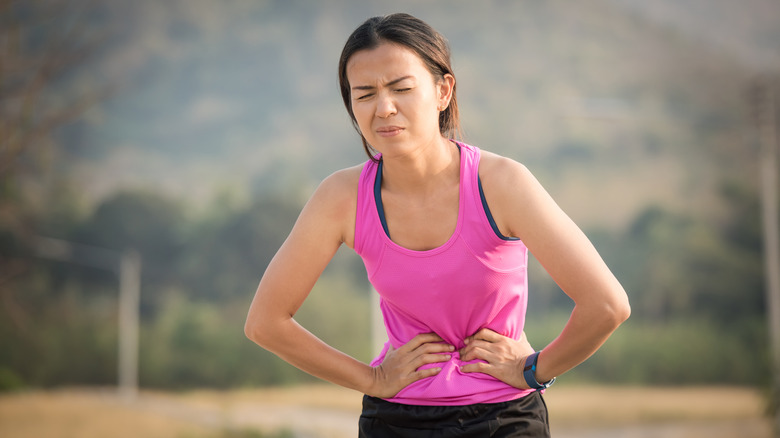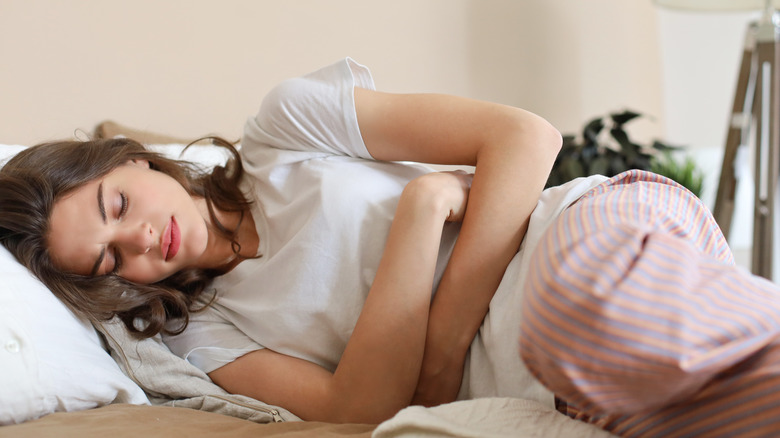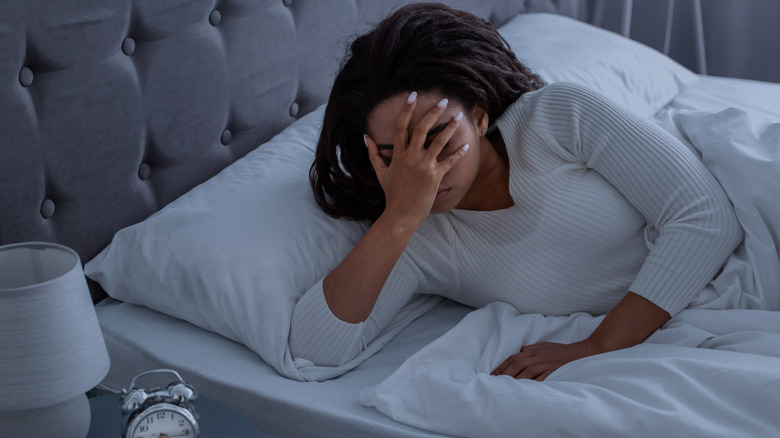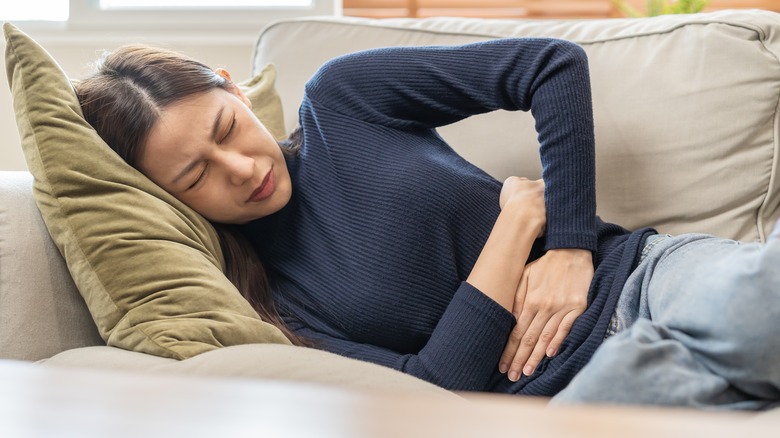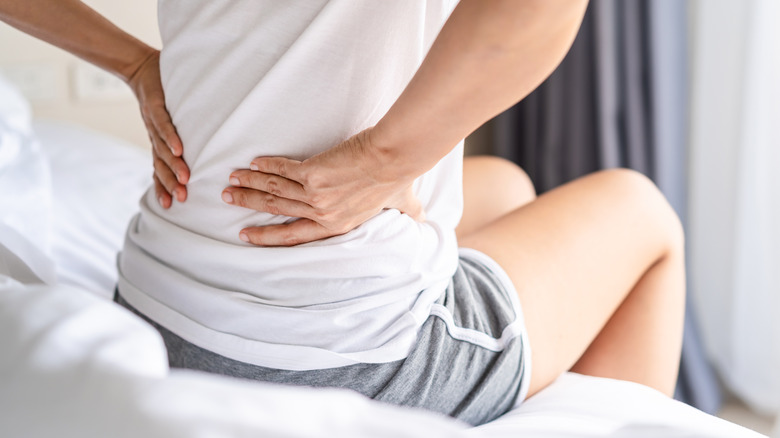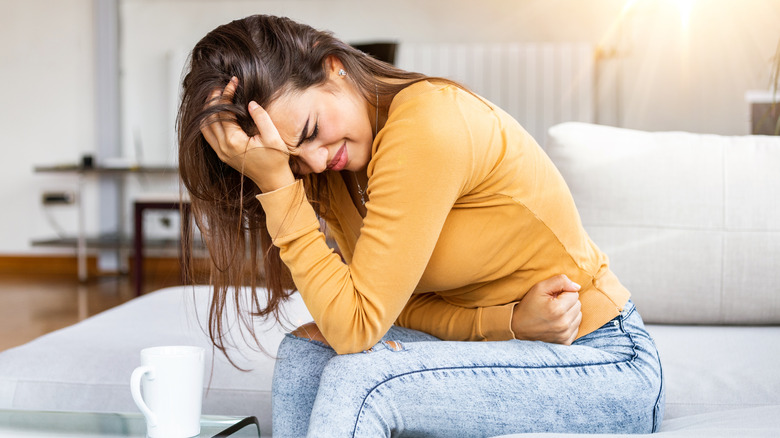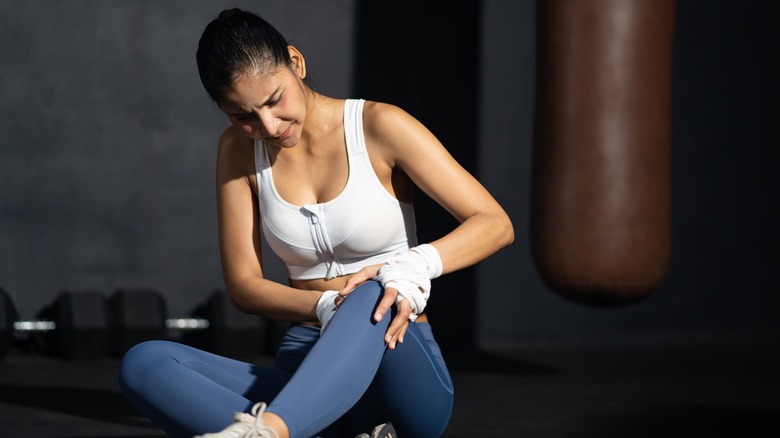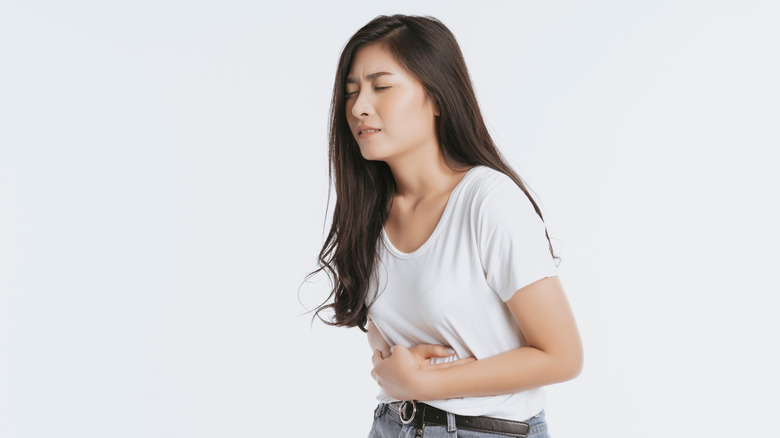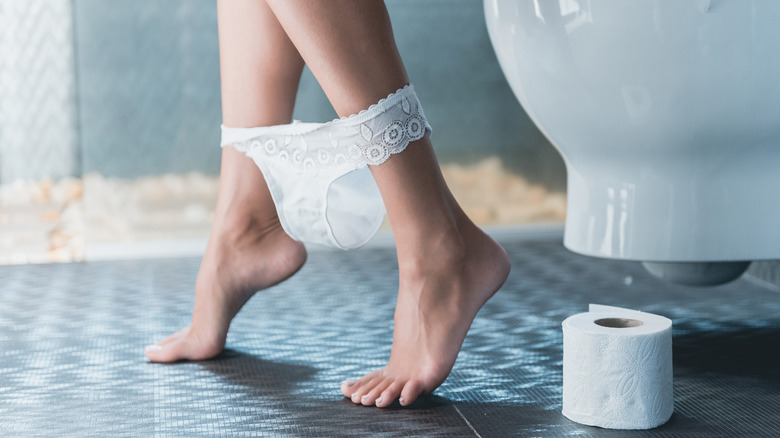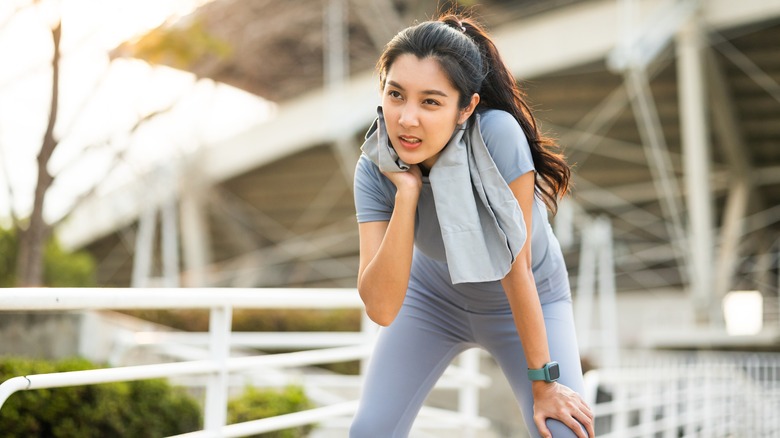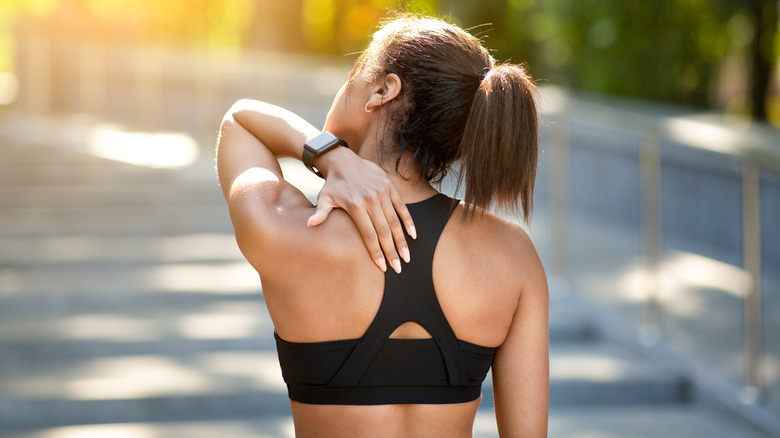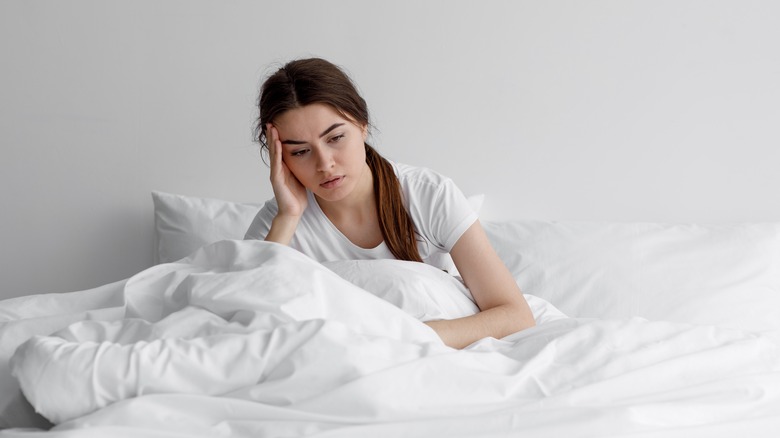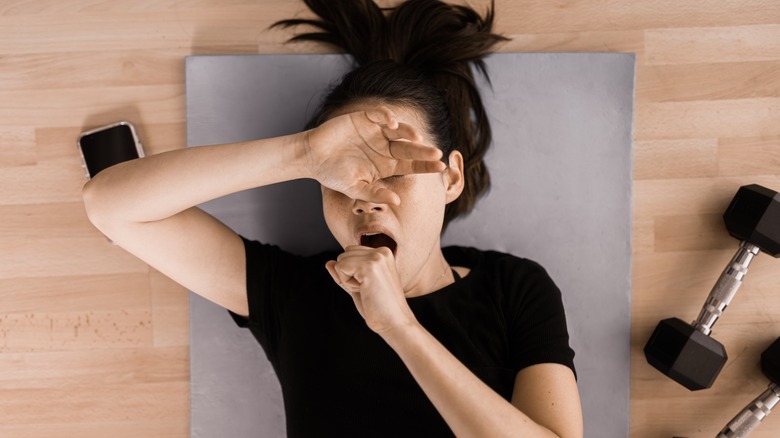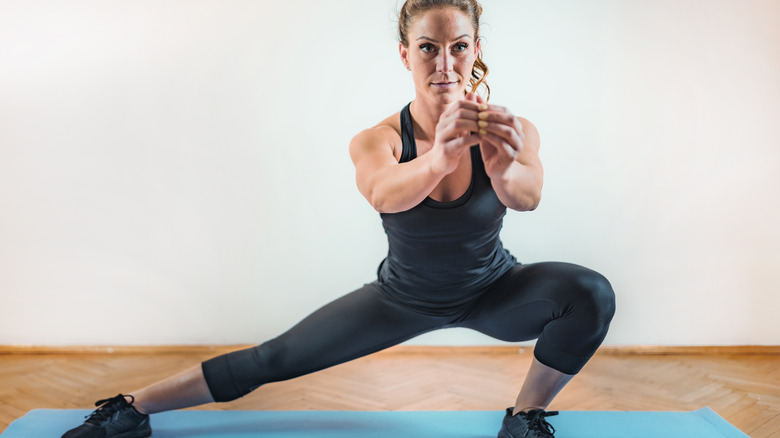Why Exercising Feels Harder When You Are On Your Period
Anybody with a uterus and ovaries knows just how hard it is to get a workout in during that time of the month. If you do manage to drag yourself to your workout mat or the gym, your workout often feels ten times harder than it did last week before the crimson tide rolled into town. Your limbs feel like they weigh a thousand pounds each, your balance is all messed up, and you're moving slower than a tired turtle. The agony of period workouts is such a universal phenomenon that it's been memeified countless times.
Kelly Lee McNulty, whose PhD research explores the impact the menstrual cycle has on athletic performance, told The Guardian that the hormonal fluctuations during a normal menstrual cycle actually do make working out feel different in each different phase. There are several really good reasons why working out feels so hard during the second half of your cycle, known as the luteal phase, most of which are driven by normal hormonal fluctuations. So, it's not just you being lazy or unmotivated. Let's break down the science behind this phenomenon.
Your period actually does make you exhausted
During your period, and maybe even for a week or so beforehand, just getting out of bed can feel like a major struggle. Period fatigue is a very real thing, according to Insider, and there are multiple physiological causes. The primary mechanism behind your bone-deep fatigue is the big hormonal swing that occurs right before Flo comes to visit. Estrogen drops dramatically right after ovulation, about two weeks before your period, and this drop can leave you feeling completely worn out. Additionally, levels of the feel-good hormone serotonin take a nosedive as well. This can create some big feels, especially of the sad or irritable variety, which can also contribute to fatigue.
Some people who experience heavy bleeding during their periods may also feel sluggish due to anemia, OB/GYN Dr Ashfaq Khan told Cosmopolitan. Losing some of the red blood cells that are critical for carrying oxygen around your body can really sap your energy levels (per Merck Manual). You're especially likely to be anemic during your period if you already struggle with anemia or borderline iron levels (via Insider).
Your lifestyle may also play a role in your period fatigue. Factors like dehydration and stress can cause fatigue at any time of the month, but they'll definitely hit you harder during your period. So, make sure you've got your water bottle with you at all times, and devote some time to stress-busting activities like mindfulness and meditation.
Your sleep schedule is all screwed up
Your period might have you feeling like you can barely get out of bed, let alone hit the gym, because you didn't get a decent night's sleep. The Sleep Foundation states that people are more likely to experience insomnia, sleep disturbances, and abnormal progression through the phases of sleep during the premenstrual and menstrual phases of their cycles. Some people also spend less time in REM sleep during their cycles, which makes the sleep they do get less restorative.
Though experts don't fully understand why your period messes with your sleep cycles, there are a few theories. One is that the shifting levels of reproductive hormones might make it more difficult to fall asleep and stay asleep. Mood is also a major factor in sleep regulation. The hormone rollercoaster of the luteal phase of your menstrual cycle can cause anxiety and depression, and these mood disturbances can disrupt your sleep all on their own.
Dr. Michael Breus, also known as The Sleep Doctor, and sleep expert Dr. W. Christopher Winter both told Aaptiv that poor sleep means that your body doesn't have as much time to recover from your workouts. Poor recovery can lead to sore muscles that stay achy for longer after you exercise. Sleep disturbances also reduce reaction time, endurance, and motivation, making your workout feel excruciating. With all that working against you, of course you feel like skipping your sweat session!
Killer cramps
One of the worst parts of having a period is the cramps. According to the Mayo Clinic, these pains in your abdomen, which can be intense and throbbing or dull and achy, are caused by prostaglandins. These hormone-like compounds trigger the uterine contractions necessary to expel the lining of the uterus each month, which is what causes menses. However, that isn't their only job. Prostaglandins are also a crucial part of the body's inflammatory and pain responses. Research has found that people whose bodies release more prostaglandins during menstruation experience worse period cramps.
Cramps can significantly reduce quality of life for people who menstruate, and a meta-analysis of studies on exercise and period cramps found that it's common for people to reduce their participation in physical activities and social activities because of period pain. However, the same meta-analysis also reported that research suggests exercise can help reduce pain associated with period cramps.
According to WebMD, doctors commonly recommend exercising to relieve period cramps as an alternative to over-the-counter pain medications. The reasoning behind the recommendation is that exercise relieves cramps because it releases endorphins, which act as the body's self-produced analgesic. Exercise may also reduce the amount of prostaglandins produced, which may limit the body's inflammatory and pain responses. So, even if working out through your period cramps feels daunting, giving it a go could result in the relief you need.
Low back pain
Between 40 and 50% of people who menstruate deal with low back pain on top of period cramps, as Stacey Missmer, professor of obstetrics, gynecology, and reproductive biology at Michigan State University College of Human Medicine, told Women's Health. Low back pain that shows up around the same time as your period is actually caused by the same thing as your period cramps — prostaglandins, OB/GYN Lisa Masterson added. The uterine contractions triggered by increased prostaglandins create pressure in the body that can be felt as back pain as well as period cramps. Additionally, prostaglandins increase overall inflammation levels in the body, which can show up as low back pain for some people who menstruate.
Many people who deal with low back pain are nervous, or downright terrified, to exercise because they think that movement will make their pain worse, NBC News reported. Even if you know that your back pain is caused by your period, not an injury, you may still be hesitant to hit the gym, especially if you think that the back pain will make your workout harder. However, hitting the gym will actually help for the same reasons that it helps relieve period cramps. According to Greatist, easy movement, like taking a walk, can give you a hit of endorphins and help calm down prostaglandin production, both of which can lead to less back pain.
You're more sensitive to pain
The hormonal fluctuations during your period not only trigger the production of more prostaglandins, one of the chemicals responsible for pain responses, they also cause increased pain sensitivity. Multiple studies have found that the way we perceive pain changes significantly throughout the menstrual cycle as the hormones that drive the menstrual cycle change.
One study published in the medical journal Clinics found that people's pain tolerance was significantly higher during the phases of the menstrual cycle when estrogen levels were high and significantly lower during the luteal phase when progesterone levels were low. Another study published in Perceptual and Motor Skills found that people living with chronic pain, who often have a different perception of pain, still report decreased pain tolerance during the premenstrual and menstrual phases of their cycles.
So, all the aches and pains you experience during your period feel agonizing because you actually do perceive pain differently during that time of the month. When you're feeling every little pain more intensely, it makes sense that a workout feels grueling and the aftereffects feel unbearable. However, according to the Lompoc Valley Medical Center, not being active can actually make your body feel worse in the long run. This doesn't mean you should be doing HIIT classes or hardcore lifting when you're already sore. Take it easy and go for a walk or just stretch. Low impact exercise is a great way to keep your body moving even when you're sore.
Fluctuating hormones change your muscles and ligaments
The hormones that drive the menstrual cycle have an impact on tissues throughout the body, not just tissues within the reproductive system. According to a study published in Medicine & Science in Sports & Exercise, the variable levels of estrogen throughout the menstrual cycle actually change the laxity of the muscles and tendons. To wit: One study published in the Muscles, Ligaments and Tendons Journal found that people were more prone to ACL injuries right after their period started until they ovulated. Another study published in Frontiers in Sports and Active Living found that injuries of all kinds were more common during the days when people's periods were due, but didn't occur — in other words, when they were "late."
Research has also suggested that body awareness changes during your period. One study in Knee Surgery, Sports Traumatology, Arthroscopy found that people are less aware of their joint positioning during their periods, which puts them at greater risk of injury, especially since the muscles and tendons are more lax during this time period.
According to Breaking Muscle, these changes in your muscles, tendons, and body awareness may show up as problems with balance and fatigue during your workouts. So, if you always feel like an uncoordinated sloth while working out on your period, there's a physiological reason for that. And this is not the time to go hard and try to break your PRs. Protect yourself by taking more rest days and planning easier workouts.
Battling the bloat
Most people who menstruate can predict when their period is coming by how well their clothes fit. Why? The dreaded period bloat. According to Greatist, our bodies retain more water during our periods, leading to that uncomfortable puffy feeling. The dropping levels of estrogen and progesterone that precede your period trigger water retention, as well as many of your other least favorite PMS symptoms.
Bloat can make working out a nightmare. First of all, finding the right clothes — something not too tight, but not so loose that you can't move well — is such a chore that Mic has a whole guide for getting dressed while on your period. To make matters worse, you might be one of those people who get bloated from working out. Personal trainer Ally McKinney told Well + Good that exercise bloating is totally a thing for some people. Usually your diet, your breathing, or both are behind exercise bloating. If you're eating foods high in fiber or fat (even good fats) right before your workout, you might be setting yourself up for bloat because these foods are more complicated to digest. And if you're doing intense workouts, you might be swallowing air as you breathe, which can blow you up like a balloon. If you're skipping the gym to avoid exercise bloat on top of period bloat, the good news is that you can usually prevent exercise bloat by eating easy-to-digest foods pre-workout and opting for less intense exercises.
Period poops
None of us want to talk about it, but a lot of us get the period poops. One study in BioMed Central Women's Health found that about a quarter of people have diarrhea during the premenstrual and menstrual phases of their cycles. Gastroenterologist Dr. Ashkan Farhadi told Hum Nutrition that the decreased levels of progesterone right before your period and during the first days of your period often lead to diarrhea or more frequent bowel movements. This is because both progesterone and estrogen play a major role in your digestive processes. Farhadi added that exercise can also impact how the gut functions. Often, it get things moving. It's a great side effect when you're dealing with constipation, but not when you're dealing with period poops.
If you don't want to work out during your period because you don't want to sprint to the bathroom, the good news is you can usually mitigate period poops at the gym by reducing the intensity of your workouts. Go for exercises that put less stress on your body and help calm the stress your period is probably causing.
And as the Cleveland Clinic points out, you do need to make sure that you're staying hydrated while you're dealing with period poops. Diarrhea can cause dehydration, and we often need to drink way more than we think we need to when we're dealing with GI upset. So make sure you're drinking a lot of water, especially if you opt for some gentle movement.
You're already hot and sweaty
Have you ever felt like you have a fever during your period? Or just felt clammy and gross? Turns out, there's a physiological reason for that. OB/GYN Dr. Shannon Clark told Popsugar that your period can actually raise your body temperature enough to give you a low-grade fever. Hormonal fluctuations cause your body temperature to change throughout your cycle, and your body gets its hottest during your period. This happens to prepare your body for a potential pregnancy. If you do get pregnant, your body temperature will remain a bit higher through the first trimester. If not, your body temperature returns to normal once your period is over.
Corey Smith, a certified health and wellness coach at University of Pittsburgh Medical Center, tells clients that the increase in their core body temperature can make working out during the premenstrual phase more difficult. You might see a decrease in your performance and feel tired more easily. One study published in the International Journal of Environmental Research and Public Health found that increases in body temperature during the premenstrual also decreased endurance.
So, if you feel hotter, sweatier, and more fatigued during your period workouts, it's because you are! Yet another reason to opt for gentler workouts during that time of the month.
It may be harder to recover from your workouts
During your period, everything is achy and sore to begin with, but if you feel like you just can't get over the soreness from your last period workout, it might be because of your period. One study published in BioMed Research International found that muscle recovery took longer during the follicular phase of the menstrual cycle, which is when menses occurs. Another study published in Research Quarterly for Exercise and Sport found that muscle fiber damage from exercise and perceived muscle soreness may increase during the menstrual cycle.
The research into this phenomenon has produced mixed results, though. Dr. Hazel Wallace of The Food Medic compared nine studies on muscle recovery and the menstrual cycle and found that some showed reduced muscle recovery in the premenstrual and menstrual phases, while others showed improved recovery or no difference compared to other phases of the menstrual cycle. However, all the studies that found that the menstrual cycle impaired muscle recovery found that muscle recovery was at its worst when estrogen levels were low.
So, more research is needed before we understand the full impact your period has on your ability to recover from working out. But if you personally feel like you're more sore after a period workout and stay sore for longer, then it may very well be due to your period — and you can keep this in mind when choosing workouts during this time.
Your body's feel-good hormones nosedive before your period
Estrogen and progesterone aren't the only hormones that ride the menstrual cycle rollercoaster. According to Dr. Kate Shkodzik, an OB/GYN and a former medical advisor for Flo, as your levels of estrogen and progesterone plunge before your period, they decrease the levels of serotonin as well. Serotonin is one of the primary chemicals that helps regulate your mood. So when serotonin levels nosedive, so does your mood, leading to irritability, anxiety, and even depression.
And according to Talkspace, depression and anxiety make it really difficult to exercise. All of the effort involved in getting ready and getting to your workout may seem too overwhelming to tackle when you've got the PMS blues. Or maybe the mean voice in your head that pops up during that time of the month is telling you that working out won't help or people will judge you or that you're not any good at working out. Or it could be depression fatigue on top of period fatigue that's got you glued to the couch. Whatever the reason, low mood can make it nearly impossible to get moving.
However, if you can force yourself to get started, exercise will probably help. According to Northwestern University, exercise triggers the release of feel-good chemicals like endorphins and endocannabanoids, which boost your mood. So, even if it feels impossible, try to get moving, just a little, to feel better.
Your motivation is at an all-time low
Low mood, killer cramps, bloating, low back pain, and fatigue are more than enough to explain why you're not motivated to move your body. But your lack of motivation may be hormonally driven as well. One study into the menstrual cycle's impact on athlete motivation found that the respondents' motivation to train or compete was lowest at day 21 of the menstrual cycle, during the premenstrual phase. The authors posited that lower levels of motivation could be linked to lower levels of testosterone during the premenstrual phase. Testosterone rises leading up to ovulation, then falls again before menstruation.
Another study published in the British Journal of Sports Medicine also found that elite athletes experienced significantly lower levels of motivation during their periods. Unlike the other studies, this study explored how the players' perception of their menstrual symptoms changed how they felt about training. A common theme among the participants was that anxiety about their menstrual symptoms and how they would impact their performance made them less likely to want to train. So, if you're completely unmotivated to work out during your period, you're not alone!
Exercises to avoid during your period
Even though working out on your period is really difficult, experts almost universally agree that exercise does help alleviate menstrual symptoms. Therefore, you should probably at least try to get some movement in. However, as Dr. Rami Hashish told Well + Good, exercise doesn't have to mean going all out. In fact, there are some exercises you probably want to avoid during your period.
The hormonal fluctuations that happen right before your period and during your period loosen the tissues in your body, which can put you at increased risk of injury. People who menstruate are more prone to lower body injuries like ACL tears, sprained or strained ankles, and sprains or strains in the knees during that time of the month. To avoid injuries while your connective tissue is all loosey goosey, avoid high-impact exercises with side-to-side movements. Dr. Gbolahan Okubadejo told Well + Good that you should also be extra mindful of posture during your workouts to ensure that you don't twist or bend in an awkward way that could lead to a back injury. And if you absolutely can't forego the high-intensity workout, make sure that you put extra time into your warm-up and listen to your body. If anything feels off, tone down your workout.
Best exercises to do during your period
What kinds of exercises should you focus on during your period? According to Mercedes Thomas, an advanced practice registered nurse and contributor for GoodRX Health, your period is a valid excuse to take it easy during your sweat sessions. She recommends low-impact cardio — like a good, long walk or swimming — and stretching exercises like yoga and Pilates. Thomas also noted that core-strengthening exercises may help relieve cramps, so getting your ab work done is a great choice. If you're typically a hardcore gym-goer, Muscle and Fitness recommends switching out your regular activities for easier exercises. Do your cardio on an exercise bike or the rowing machine. Opt for lighter weights or even bodyweight exercises.
The bottom line is that you will, in fact, feel better if you move your body a little. But find ways to exercise that don't exacerbate your symptoms, and don't feel bad about taking it easy. Your body needs some TLC during that time of the month.

